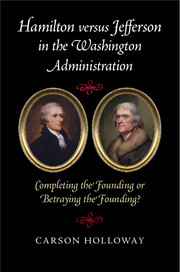 Hamilton versus Jefferson in the Washington Administration
Hamilton versus Jefferson in the Washington Administration Book contents
- Frontmatter
- Dedication
- Contents
- Acknowledgments
- 1 Introduction
- PART I A DEBATE BETWEEN CABINET COLLEAGUES
- PART II A CLASH OF RIVAL PARTY LEADERS
- PART III Founding Foreign Policy
- 11 Two Views of the French Revolution
- 12 Faith among Nations I: Jefferson's Opinion on the French Treaties
- 13 Faith among Nations II: Hamilton's Opinion on the French Treaties
- 14 The Constitutional and Political Theory of Hamilton's Pacificus Papers
- 15 Jefferson, Madison, and Helvidius' Critique of Pacificus
- 16 Conclusion
- Index
13 - Faith among Nations II: Hamilton's Opinion on the French Treaties
from PART III - Founding Foreign Policy
Published online by Cambridge University Press: 05 November 2015
- Frontmatter
- Dedication
- Contents
- Acknowledgments
- 1 Introduction
- PART I A DEBATE BETWEEN CABINET COLLEAGUES
- PART II A CLASH OF RIVAL PARTY LEADERS
- PART III Founding Foreign Policy
- 11 Two Views of the French Revolution
- 12 Faith among Nations I: Jefferson's Opinion on the French Treaties
- 13 Faith among Nations II: Hamilton's Opinion on the French Treaties
- 14 The Constitutional and Political Theory of Hamilton's Pacificus Papers
- 15 Jefferson, Madison, and Helvidius' Critique of Pacificus
- 16 Conclusion
- Index
Summary
Hamilton presented his opinion on the French treaties to Washington on May 2, 1793. Unlike Jefferson, who had gone straight to the question of the status of the treaties themselves, Hamilton began with the related question of whether the United States should receive the French minister with or without qualifications. He argued that the reception of Genet should be “qualified by a previous declaration” reserving America's right to determine the status of the treaties at a later time. The message was to be friendly but firm. On the one hand, Hamilton recommended an expression of America's “cordial wishes for the happiness of the French nation,” its disposition to “maintain” with France an “amicable communication and intercourse,” and its lack of hesitation to receive the French minister. On the other hand, while the government should not confront France with the possibility of a complete renunciation of the treaties, it should make clear to the French minister – “in a spirit of candid and friendly procedure” – that it found it “advisable and proper” to “reserve to future consideration and discussion” whether the treaties should be “temporarily and provisionally suspended,” “lest silence on the point should occasion misconstruction.”
Hamilton's Review of the “Material Facts”
Hamilton then proceeded to elaborate the “grounds” of his opinion, turning first to the circumstances surrounding France's recent changes in government. Where Jefferson had emphasized the welcome transition from despotism to republicanism, Hamilton stressed a step that Jefferson's opinion had omitted: the transition from constitutional monarchy to republicanism, in which French republicans had taken steps of at least doubtful legitimacy. “The treaties between the United States and France were made,” Hamilton observed, “with His Most Christian Majesty, his heirs and successors.” The French government that had entered into those treaties was later replaced by a “new constitution, formed by the representatives of the nation, and accepted by the king.” So far, Hamilton's argument implied, the political changes in France did not offer grounds on which America could question the continuation of the treaties. Subsequent events, however, called into question the legitimacy of the present French government. After a period of time under its new constitutional monarchy, a “sudden” and “tumultuous rising took place” as a result of which “the king was seized, imprisoned, and declared to be suspended by the authority of the National Assembly.”
- Type
- Chapter
- Information
- Hamilton versus Jefferson in the Washington AdministrationCompleting the Founding or Betraying the Founding?, pp. 238 - 255Publisher: Cambridge University PressPrint publication year: 2015


